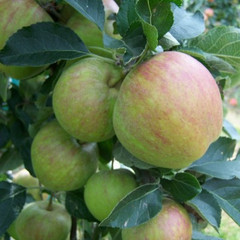Description
One of the oldest known varieties in the world, and it is not improbable that its origins go as far back as ancient Rome. This variety has a long list of virtues - the fruit is very crisp with a lovely slightly acidic flavour and is borne freely; it is very hardy and very late to flower (thus escaping the frosts, and hence one synonym of the Wise Apple); and growth is compact making it suitable for the smaller garden or even pot culture. Court Pendu Plat = short, hanging, and flat (Refers to the fruit).
"An apple with a descriptive French name having 165 synonyms, and found in translation in the German, Polish, Romanian, Russian, and Scandinavian languages, as is often the case with apples that are widely dispersed and of ancient origin. It is known in France as Court Pendu Rouge. It was mentioned by the older Bauhin brother, Johannes (Jean), who found it in France, growing amongst Gallo-Roman ruins at Mandeure in Doubs, near to the Swiss Border, in the late 16th century. It has been known in Britain at least since the 1700s, and esteemed for centuries as a most delicious dessert apple.
It is not at all impossible that Court Pendu Plat has Roman origins, though unlikely to be proven, unless and until we can trace and collate the DNA of fruits bearing the name across its diaspora. How fascinating if it had come to Britain during the first four centuries of the current era, when these islands were under Roman occupation. 'There is no fundamental genetic reason why these cultivars should not have survived since Roman times', say Juniper and Mabberley, in The Story of the Apple (2006), though, as they go on to comment, many ancient cultivars have succumbed to an accumulation of viruses and the like. Robert Thompson, of the Royal Horticultural Society's Chiswick Garden, in the late nineteenth century said that though an excellent fruit, it was 'difficult to obtain in a vigorous condition.'
The name means, short, hanging, flat. It is unusually flat in shape, and hangs from so short a stalk as to appear to be sitting on the branch. It is also known as the Wise Apple, on account of its very late flowering, thereby escaping the frosts. Hilary Wilson notes that this habit is particularly distinct in the Lune Valley in Cumbria, where it remains apparently as dead as a doornail almost till June, then bursts into flower. It is suitable for organic culture.
The intensely fruity flavour of Court Pendu Plat, with a pineapple-infused, sweet-sharp balance, becomes sweeter as it mellows in storage; it is also high in vitamin C (15—20mg/100g). It is interesting to note that the complex flavour and fragrance of this very old apple results from the iso-esters, which are most often found in older fruit varieties. Research in New Zealand indicates high levels in many older varieties — 'unimproved', if you like — of flavonoids, quercitin glycosides, proanthocyanins and catechins, mostly in the skin. These are all potent antioxidants; how long before the old apple is hailed as the new superfood?" © Lin Hawthorne - 'The Northern Pomona'.
For help with choosing the correct rootstock for your needs, please click here A Guide to Rootstocks
For help with choosing the correct size and shape, please click here A Guide to Fruit Tree Shapes







